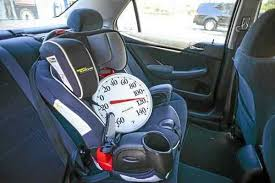Hyperthermia and Children Left in Vehicles
May 23, 2018

Richland Public Health
Summer Heat Makes It Especially Dangerous to Leave Children in Cars
The risk of a serious injury or death during hot weather is heightened for children left alone in vehicles, the National Highway Traffic Safety Administration (NHTSA) has warned. Research shows that for children hyperthermia (heat-stroke) is the leading cause of non-crash vehicle deaths.
"Even with the windows rolled down two inches, it only takes 10 minutes for the inside of a vehicle to reach deadly temperatures on a hot summer day," said David L. Strickland, Administrator of NHTSA. "Children should never be left alone in or around a motor vehicle, not even for a quick errand. Any number of things can go critically wrong in the blink of an eye."
Each year, 262 children under the age of 14 are killed and 115,000 are injured in not-in-traffic incidents on private roads, driveways and in parking lots according to a new NHTSA study. Out of that number, 44 fatalities and 105,000 injuries are the results of non-crashes. These incidents include hyperthermia, strangulation by power windows, carbon monoxide poisoning and more. Many of the remaining deaths and injuries in not-in-traffic incidents are the result of a vehicle backing over a child that the driver did not see.
What you need to know, now:
- Vehicles heat up quickly – even with a window rolled down two inches, if the outside temperature is in the low 80s° Fahrenheit, the temperature inside a vehicle can reach deadly levels in only 10 minutes.
- Children’s bodies overheat easily, and infants and children under four years of age are among those at greatest risk for heat-related illness.
- Children’s bodies absorb more heat on a hot day than an adult. Also, children are less able to lower their body heat by sweating. When a body cannot sweat enough, the body temperature rises rapidly.
- In fact, when left in a hot vehicle, a young child’s body temperature may increase three to five times as fast an adult. High body temperatures can cause permanent injury or even death.
Safety tips from NHTSA to prevent hyperthermia include:
- Never leave a child unattended in a vehicle.
- Do not let your children play in an unattended vehicle. Teach them that a vehicle is not a play area.
- Never leave infants or children in a parked vehicle, even if the windows are partially open or with the engine running and the air conditioning on.
- Make a habit of looking in the vehicle – front and back – before locking the door and walking away.
- If you are bringing your child to daycare, and normally it’s your spouse or partner who brings them, have your spouse or partner call you to make sure everything went according to plan.
- Ask your childcare provider to call you if your child does not show up for childcare. Do things to remind yourself that a child is in the vehicle, such as: — Writing yourself a note and putting the note where you will see it when you leave the vehicle; — Placing your purse, briefcase or something else you need in the back seat so that you will have to check the back seat when you leave the vehicle; — Keeping an object in the car seat, such as a stuffed toy. When the child is buckled in, place the object where the driver will notice it when he or she is leaving the vehicle.
- Always lock vehicle doors and trunks and keep keys out of children’s reach. If a child is missing, check the vehicle first, including the trunk.
Dangers of Extreme Heat
- Symptoms of heatstroke: Warning signs vary but may include: red, hot, and moist or dry skin, no sweating, a strong rapid pulse or a slow weak pulse, a throbbing headache, dizziness, nausea, confusion, being grouchy or acting strangely.
- If you see a child alone in a hot vehicle, call the police. If they are in distress due to heat, get them out as quickly as possible. Cool the child rapidly. Call 911 or your local emergency number immediately.
« Back to News
